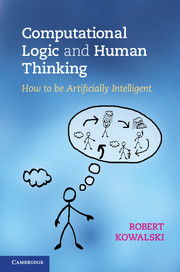Book contents
- Frontmatter
- Contents
- Preface
- Summary and plan of the book
- Introduction
- 1 Logic on the Underground
- 2 The psychology of logic
- 3 The fox and the crow
- 4 Search
- 5 Negation as failure
- 6 How to become a British Citizen
- 7 The louse and the Mars explorer
- 8 Maintenance goals as the driving force of life
- 9 The meaning of life
- 10 Abduction
- 11 The Prisoner’s Dilemma
- 12 Motivations matter
- 13 The changing world
- 14 Logic and objects
- 15 Biconditionals
- 16 Computational Logic and the selection task
- 17 Meta-logic
- Conclusions of the book
- A1 The syntax of logical form
- A2 Truth
- A3 Forward and backward reasoning
- A4 Minimal models and negation
- A5 The resolution rule
- A6 The logic of abductive logic programming
- References
- Index
5 - Negation as failure
Published online by Cambridge University Press: 07 September 2011
- Frontmatter
- Contents
- Preface
- Summary and plan of the book
- Introduction
- 1 Logic on the Underground
- 2 The psychology of logic
- 3 The fox and the crow
- 4 Search
- 5 Negation as failure
- 6 How to become a British Citizen
- 7 The louse and the Mars explorer
- 8 Maintenance goals as the driving force of life
- 9 The meaning of life
- 10 Abduction
- 11 The Prisoner’s Dilemma
- 12 Motivations matter
- 13 The changing world
- 14 Logic and objects
- 15 Biconditionals
- 16 Computational Logic and the selection task
- 17 Meta-logic
- Conclusions of the book
- A1 The syntax of logical form
- A2 Truth
- A3 Forward and backward reasoning
- A4 Minimal models and negation
- A5 The resolution rule
- A6 The logic of abductive logic programming
- References
- Index
Summary
It’s easy to take negation for granted, and not give it a second thought. Either it will rain or it won’t rain. But definitely it won’t rain and not rain at the same time and in the same place. Looking at it like that, you can take your pick. Raining and not raining are on a par, like heads and tails. You can have one or the other, but not both.
So it may seem at first glance. But on closer inspection, the reality is different. The world is a positive, not a negative place, and human ways of organising our thoughts about the world are mainly positive too. We directly observe only positive facts, like this coin is showing heads, or it is raining. We have to derive the negation of a positive fact from the absence of the positive fact. The fact that this coin is showing heads implies that it is not showing tails, and the fact that it is sunny implies, everything else being equal, that it is not raining at the same place and the same time.
- Type
- Chapter
- Information
- Computational Logic and Human ThinkingHow to Be Artificially Intelligent, pp. 60 - 76Publisher: Cambridge University PressPrint publication year: 2011



